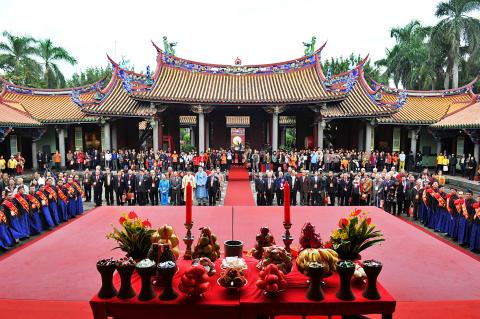Taipei Confucius Temple will offer visitors a new experience through the presentation of its history and teachings in “4D” film format soon.
For example, a stereoscopic depiction of the interaction between Confucius (孔子), his disciples and the rulers of several nations, set against the backdrop of ancient China, will be accompanied by special physical effects such as falling snow, wind and vibrations.
The 15-minute film, to be shown in the temple’s 4D theater that will open later this year, highlights Confucius’ philosophy on music and courtesy.

Photo: CNA
“Most of the film’s stories were drawn from chapters of the Analects of Confucius, but we’ve made them more interesting,” Sh Shu-li, executive secretary of Taipei Confucius Temple’s governing board, said in a recent interview.
Another film traces the history of the temple itself — the only Confucius temple in Taiwan that was built by the public rather than the government.
First built in 1884 during the Qing Dynasty, the Taipei Confucius Temple was torn down by the Japanese colonial government in 1907.
Eighteen years later, a group of local gentry decided to rebuild the temple on land donated by some of its members. Taipei Confucius Temple, as it stands today, was completed in 1939. It was donated to the Taipei City Government in 1971 and has been under its jurisdiction ever since.
The Taipei temple has a less solemn atmosphere than other Confucius temples built by the government, Sh said.
As part of its efforts to present Confucian teachings and philosophy in a more modern format, the temple also has multimedia simulations of the “Six Arts” — rites, music, archery, charioting, calligraphy and mathematics.
According to Confucian teaching, these arts are central to a well-rounded education.
The multimedia components, which were launched last month, include interactive devices, animated videos and games that are featured in different areas of the temple to encourage visitors to explore the Six Arts.
In one space, a device allows visitors to “hold” a brush to practice calligraphy, while in another area people can play a charioting game.
“Our multimedia equipment is what sets our temple apart from others,” said Tzeng Kung-yu, a member of the temple’s governing board.
“The multimedia devices are so popular among visitors on weekends that we often run out of souvenirs to give to them,” Tzeng said.
A popular tourist site, Taipei Confucius Temple attracted 330,780 visitors, nearly 46 percent of whom were from overseas, from January to November last year.
“Our foreign visitors are mostly from Europe, Japan and the United States,” Sh said.
Many people from other places such as China and South Korea also visit the temple.
“I think the new 4D theater and the multimedia presentations will help to attract even more visitors,” she said. “With these new additions, we expect visitors will spend more time at the temple.”

Aftershocks from a magnitude 6.2 earthquake that struck off Yilan County at 3:45pm yesterday could reach a magnitude of 5 to 5.5, the Central Weather Administration (CWA) said. Seismological Center technical officer Chiu Chun-ta (邱俊達) told a news conference that the epicenter of the temblor was more than 100km from Taiwan. Although predicted to measure between magnitude 5 and 5.5, the aftershocks would reach an intensity of 1 on Taiwan’s 7-tier scale, which gauges the actual effect of an earthquake, he said. The earthquake lasted longer in Taipei because the city is in a basin, he said. The quake’s epicenter was about 128.9km east-southeast

GENSLER SURVEY: ‘Economic infrastructure is not enough. A city needs to inspire pride, offer moments of joy and foster a sense of belonging,’ the company said Taipei was named the city with the “highest staying power” in the world by US-based design and architecture firm Gensler. The Taiwanese capital earned the top spot among 65 cities across six continents with 64 percent of Taipei respondents in a survey of 33,000 people saying they wanted to stay in the city. Rounding out the top five were Vietnam’s Ho Chi Minh City (61 percent), Singapore (59 percent), Sydney (58 percent) and Berlin (51 percent). Sixth to 10th place went to Monterrey, Mexico; Munich, Germany; Sao Paulo, Brazil; Vancouver; and Seoul. Cities in the US were ranked separately, with Minneapolis first at

The New Taipei City Government today warned about the often-overlooked dangers of playing in water, and recommended safe swimming destinations to cool off from the summer heat. The following locations in the city as safe and fun for those looking to enjoy the water: Chienshuiwan (淺水灣), Baishawan (白沙灣), Jhongjiao Bay (中角灣), Fulong Beach Resort (福隆海水浴場) and Sansia District’s (三峽) Dabao River (大豹溪), New Taipei City Tourism and Travel Department Director-General Yang Tsung-min (楊宗珉) said. Outdoor bodies of water have variables outside of human control, such as changing currents, differing elevations and environmental hazards, all of which can lead to accidents, Yang said. Sudden

Tropical Storm Podul has formed over waters north-northeast of Guam and is expected to approach the seas southeast of Taiwan next week, the Central Weather Administration (CWA) said today. The 11th Pacific storm of the year developed at 2am over waters about 2,660km east of Oluanpi (歐鑾鼻), Pingtung County — Taiwan's southernmost tip. It is projected to move westward and could have its most significant impact on Taiwan on Wednesday and Thursday next week, the CWA said. The agency did not rule out the possibility of issuing a sea warning at that time. According to the CWA's latest update, Podul is drifting west-northwest